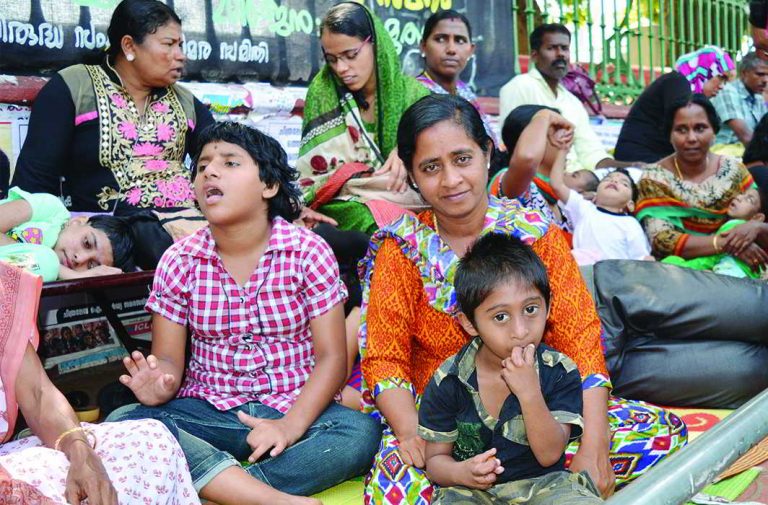
The Supreme Court has asked Kerala to pay this compensation to victims of Endosulfan poisoning, giving a ray of hope for their slow rehabilitation and recovery
~By Ramesh Menon
Ver 5,000 Endosulfan poisoning victims in Kerala might soon get the compensation that they have been waiting for. Endosulfan is an insecticide that as many as 81 countries have banned because it is hazardous. India, which is the largest producer and user of Endosulfan, banned it in 2011 after systematic campaigning by environmentalists.
On January 10, the Supreme Court gave the Kerala government 90 days time to give a compensation of Rs 500 crore to the victims of Endosulfan poisoning in the state. The Court also directed the state to recover this money from pesticide industries or from the Union government. The apex court was hearing a PIL filed by the Democratic Youth Federation of India in 2012, which had highlighted the adverse effects of Endosulfan and how thousands were suffering from it in Kerala.
” font_container=”tag:p|font_size:20px|text_align:left|color:%23000000″ google_fonts=”font_family:Open%20Sans%3A300%2C300italic%2Cregular%2Citalic%2C600%2C600italic%2C700%2C700italic%2C800%2C800italic|font_style:700%20bold%20regular%3A700%3Anormal”]
The Supreme Court had appointed an expert committee that comprised the director general of health services, member secretary of the Central Pollution Control Board and the director of the National Institute of Occupational Health. The panel reported that Endosulfan posed serious health hazards, especially to the reproductive system, and could lead to congenital deformities. It recommended the phasing out of the pesticide.
The pesticide industry which was lobbying hard for over 15 years saying that Endosulfan had no adverse effects on health, had put the safe disposal of existing stocks of the pesticide at nearly Rs 2,000 crore. It had even appealed to the centre to allow it to export the pesticide as it was banned in India.
A bench headed by Chief Justice JS Khehar asked the Kerala government to consider setting up a centre to ensure life-long medical treatment to the victims. If this happens, it will be a landmark gesture by the state and a lesson to all others who succumb to pressure from the pesticide industry to push chemical farming.
States like Punjab are already reeling from chemical farming, poisoning their land beyond repair. In districts like Bhatinda, which leads the country as the largest user of pesticides, almost every house has a cancer patient. It is the same story in Warangal in Andhra Pradesh, the second largest user of pesticides in India. Here, the after-effects of pesticides are showing up in infertility cases and other ailments. Kerala and Karnataka are the only states that have banned it.
Usha Nandini, advocate-on-record, Supreme Court, told India Legal: “Now that the compensation issue is settled by the Court with a specific time frame, the government must now concentrate on creating facilities for the victims and ensure their well-being.”
Government studies had shown that Endosulfan not only delays maturity in boys and causes early maturity in girls, it leads to cancer, stunted growth, congenital defects, blindness and genetic defects. But studies done by the National Institute of Occupational Health and the Kerala government were ignored. These looked at the effects in Kasaragod district where Endosulfan was sprayed by helicopters over cashew plantations for decades.
In 2011, at the fifth Conference of Parties of the UN-backed Convention on Persistent Organic Pollutants in Geneva, India even tried to circulate a draft saying that Endosulfan did not lead to health hazards. But it changed its stand fearing it would be isolated if put to vote. Ultimately, India was forced to give in to international pressure.
Kerala has done much for Endosulfan victims. In April last year, Dr K Ellangovan, Secretary, Health and Family Welfare, Kerala, informed the central government that the state had issued orders for granting compensation of Rs 5 lakh each to completely bed-ridden patients, to mentally retarded persons who were born after the aerial spraying of Endosulfan in Kerala and to the next-of-kin of deceased victims. A sum of Rs 3 lakh was allocated to those with any disability and those who had contracted cancer.
Besides this, free medical treatment in 17 hospitals, monthly assistance for caretakers of bed-ridden and mentally retarded victims, services of physiotherapists in all the 11 affected panchayats, special schools in six of the affected panchayats, free ration to all the affected families, transportation facilities to victims for visiting hospitals and free dialysis facilities was given. As many as 678 loans to victims, totalling Rs 1.21 crore were waived off, he said. The Kerala government had also constituted a committee to continue examining suspected cases. It also envisages a rehabilitation village in Muliyar panchayat of Kasaragod district where the specific needs of these physically and mentally challenged people would be addressed.
On the basis of the recommendations of the National Human Rights Commission, Kerala asked the centre for financial support of Rs 483.3 crore for rehabilitation activities and assistance to victims. However, it got only Rs 13.87 crore. Till now, Kerala has disbursed over Rs 89 crore to the victims.
The Plantation Corporation of India on whose land cashew plantations were aerially sprayed with Endosulfan for over 20 years, has given Rs 53.105 crore to Kerala as compensation for the victims. The Corporation has petitioned the District Court in Kottayam to recover this amount from Endosulfan manufactures in India.
This case will be a lesson for all industries dealing with deadly chemicals which play havoc with people’s health.
Lead picture: Parents of children suffering from the after-effects of Endosulfan poisoning stage a dharna in front of the Secretariat in Thiruvananthapuram. Photo: UNI

